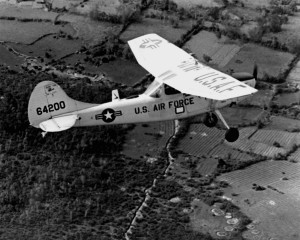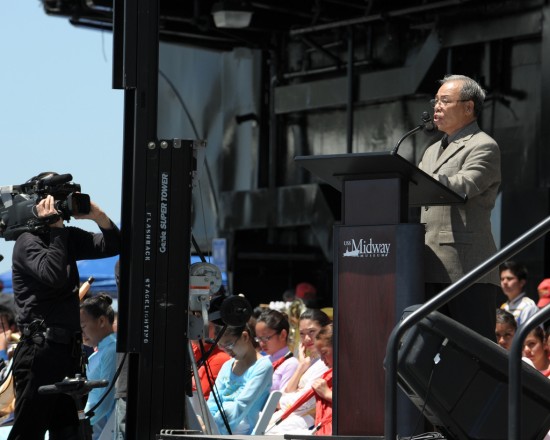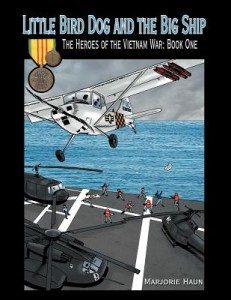 The first time I heard the story of Bung Ly and his amazing landing of a little Cessna O-1 Bird Dog on the deck of the USS Midway, April 30, 1975, it was the recounting of an acquaintance of mine who had been on board the ship at the time. This gentleman was a Navy Seal and his role during Operation Frequent Wind had been to scope out the POW camps and evacuate any of our guys who might have been left behind. Saigon was falling, operations were closing down, and the Midway was literally shipping out of the South China Sea.
The first time I heard the story of Bung Ly and his amazing landing of a little Cessna O-1 Bird Dog on the deck of the USS Midway, April 30, 1975, it was the recounting of an acquaintance of mine who had been on board the ship at the time. This gentleman was a Navy Seal and his role during Operation Frequent Wind had been to scope out the POW camps and evacuate any of our guys who might have been left behind. Saigon was falling, operations were closing down, and the Midway was literally shipping out of the South China Sea.
My friend’s account of Bung Ly’s story; the landing of a fragile observation plane crammed with children on the cluttered ship, in the midst of the largest helicopter evacuation effort in human history, seemed just incredible to me. As I researched the story and found his report to be totally accurate and breathtakingly moving, my own memories of the end of the Vietnam War began to surface. I was a teenage girl in 1975 so what I remember about the war is what was broadcast by the press of the time. My parents lost their oldest son and I lost my oldest brother in 1970. With broken hearts they endured the following years of war, political upheaval, and national humiliation, and I remember them saying, “Thank God, it’s over.”
Many times the question has been asked of me, “why would you write a kid’s book about the Vietnam War?” Others have expressed a similar thought by saying, “There was nothing good about that war. War is a terrible thing.” But the essence of that shared bewilderment boils down to this thought; That was a painful and incoherent time in American history. Why would you want to remember the Vietnam War? My earnest answer has always been, “We have among us a generation of men, fathers, grandfathers, ordinary guys, who fought in that war. We have to acknowledge that they did the right thing by serving their country. They are living heroes. There is no shame in remembering them as they were.”
The Vietnam War is rarely mentioned in history texts, and when it is the spin is negative and does nothing to help young people form a context of what it means to serve one’s country even when the war is unpopular and unclear. We need a written history of the Vietnam War for children that weaves a filament of patriotism through those years, just as World War II gave us the Greatest Generation, and the Gulf War gave us a speedy and high-tech victory over a plodding foe. My remembering of Vietnam is inspired by the men who, unlike my brother Don, came home to live their lives and re-assimilate, and despite the national forgetting, have been bound together by unbreakable ties of blood and memory.
I’ve enjoyed dozens of interactions with Vietnam veterans, some who will talk, some who prefer to be silent, and some who simply want to thank me for recognizing the value of their service. Through my research of books one, Little Bird Dog and the Big Ship, and two, Saving the Vietnamese Orphans, I’ve been privileged to encounter and correspond with the people who are the history of the Vietnam War, people like Dennis “Bud” Traynor, the captain of the C-5 that crashed at the outset of Operation Babylift, Betty Tisdale, the “Angel of Saigon,” and Lana Noone, one of the adoptive parents of Operation Babylift who became an advocate for the orphans and a pioneer in Asian adoption programs.
An adoptive mother recently left a beautiful comment on the Facebook page for “The Heroes of the Vietnam War: Books for Children,” that told of how the baby she had adopted was killed in the C-5 crash that took the lives of 78 Vietnamese orphans. Individuals and business owners from Vietnam regularly leave comments about my books. They are always positive, and the Vietnamese people who reach out to me invariably express thanks to the American servicemen, and regret that they could not remain to help them fight the Communists. Children of the evacuation; adoptees as well as those who fled to America with their families of origin, are incredibly positive about my books. They want us to remember the Vietnam War and its sad ending, because it was the formative event in their lives.
Here are some of the comments:
- Lana Noone–Congratulations, Marjorie and many thanks for “Saving the Vietnamese Orphans”! Best wishes for great success with Book 2 in your Series!!
- Clara Bayot Obl Angel–My family appreciates your efforts to teach the children about Babylift especially on behalf of our Clara Bayot who perished on the first C5-A flight 04.04.1975. The internet has connected many of us descendants to our lost ones, our OBL “Angels”… thank you Marjorie. -Yvette, niece of Clara & family historian
- Thien Hung Huynh–Thanks to American serviceman! after 37 years. our country is down!!!! republic of vietnam is lost forever!!! So sad…….Hope someday Vietnam will be rich like before and vietnam and america will be bestfriend like before! Thanks to all vietnam-americacn [sic] warriors!
When I reflect on these grateful comments and the heartfelt reactions I get from Vietnam veterans and their families, it is very clear to me why “I would want to write a kid’s book about the Vietnam war.” History is a common treasure. The history of war is a common human theme that is woven through every generation that has walked upon the earth. For American children to understand who they are and why they have they country they do; a country that was purchased through installments of blood, they must understand the conditions of war, and they must appreciate the character of the warriors who fought it. When they comprehend the adversity heaped upon servicemen who fought the Vietnam War, and why certain men and women chose to intervene and fight for America, even when politicians, the popular culture, the media, and their friends despised them for it, then they will understand what it means to be a hero. For countless American children, learning about the Vietnam War through a series of patriotic and positive books will give them an opportunity to crawl on their granddaddy’s lap and ask, “what did you do in Vietnam?”
Photo Credits
Cessna 0-1 Bird Dog – Wikipedia Public Domain
“Honoring Freedom in America Aboard the USS Midway” by Port of San Diego @ flickr.com. Creative Commons. Some rights reserved.
Photo © Marjorie Haun
Guest Author Bio
Marjorie Haun Marjorie Haun is a commentator, reporter and an author of children’s books. She has written and maintained her own website, ReaganGirl.com, for two years. Her works include articles for The Heritage Foundation’s Foundry, The Daily Pamphlet, The American Thinker as well as several small newspapers and websites. Her background in special education has given her a deep of understanding about what is appealing to children of all ages and developmental stages. She has also written and directed short plays and musicals. Haun is active in civic organizations as well as her church. Marjorie Haun lives in Western Colorado. She is writing a series of books for children titled, The Heroes of the Vietnam War. Little Bird Dog and the Big Ship is the first book in the series.
Marjorie Haun is a commentator, reporter and an author of children’s books. She has written and maintained her own website, ReaganGirl.com, for two years. Her works include articles for The Heritage Foundation’s Foundry, The Daily Pamphlet, The American Thinker as well as several small newspapers and websites. Her background in special education has given her a deep of understanding about what is appealing to children of all ages and developmental stages. She has also written and directed short plays and musicals. Haun is active in civic organizations as well as her church. Marjorie Haun lives in Western Colorado. She is writing a series of books for children titled, The Heroes of the Vietnam War. Little Bird Dog and the Big Ship is the first book in the series.
Follow Marjorie on: Twitter | Facebook
Recent Guest Author Articles:
- How Strong Business Training Translates Into Everyday Decision-Making
- New Career and Degree Paths for Educators Who Want to Make a Broader Impact
- Finding the Right Plumber in Portland: A Comprehensive Guide for Homeowners
- Why Choose Elara Caring for Jackson, MI Home Health Services?
- How I Turned Poetry into a Paycheck




Thank you for this wonderful article. As a filmmaker, I have gotten the chance to not only interview a Vietnam veteran about his perspectives on war and peace, but to also capture his transformative journey and tell parts of his story in my documentary film “9 Pieces of Peace” (9piecesfilm.com). This article reminds us of why we can’t forget about the Vietnam War and the veterans who bravely served this country.